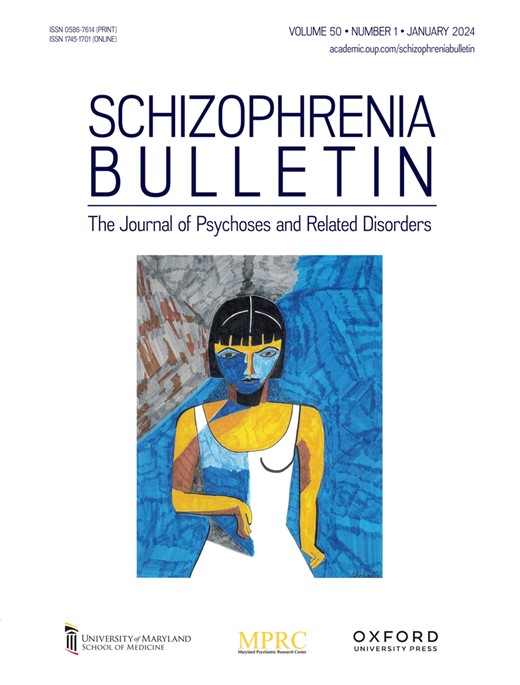Advancing Understanding of Treatment Response in Schizophrenia With Psychosis Using a Novel Dynamic Reward Task
IF 5.3
1区 医学
Q1 PSYCHIATRY
引用次数: 0
Abstract
Background and Hypothesis Schizophrenia presents significant treatment challenges, particularly due to medication resistance observed in some patients receiving antipsychotics. Emerging research suggests a potential link between impaired reinforcement learning, the severity of psychotic symptoms, and dopamine system abnormalities. Exploring reinforcement learning in therapeutic settings could provide critical insights into the efficacy of antipsychotic treatments. This study aimed to investigate whether neurocognitive profiles, specifically choice strategies and model fitting parameters assessed using the Dynamic Reward Task (DRT), could provide insights into treatment response variability among patients with schizophrenia. Study Design We conducted a comprehensive neurocognitive assessment on chronic schizophrenia patients experiencing psychotic relapse, categorized by treatment response (high-response vs low-response). Participants underwent DRT, Wisconsin Card Sorting Test (WCST), and Continuous Performance Test (CPT) to evaluate reward processing, executive function, and sustained attention, respectively. We employed statistical analyses to compare task performance between groups and assess changes before and after antipsychotic treatment. Study Results We identified significant differences in treatment effects across different response groups in DRT scores, choice strategies, and model-fitting parameters. Conversely, all schizophrenia groups had consistent abnormalities on the WCST and CPT evaluations compared to controls. Conclusions Our findings highlight the efficacy of DRT, WCST, and CPT in delineating neurocognitive profiles relevant to treatment response in schizophrenia. Specifically, the DRT effectively differentiated between high- and low-response patients. Distinct deficits in reward processing and executive function identified here may serve as potential indicators, informing personalized treatment strategies tailored to individual responses to antipsychotic medication.利用一种新的动态奖励任务促进对精神分裂症合并精神病治疗反应的理解
背景与假设精神分裂症在治疗上存在重大挑战,特别是在一些接受抗精神病药物治疗的患者中观察到耐药性。新兴研究表明,强化学习受损、精神病症状严重程度和多巴胺系统异常之间存在潜在联系。在治疗环境中探索强化学习可以为抗精神病治疗的疗效提供重要的见解。本研究旨在探讨神经认知特征,特别是使用动态奖励任务(DRT)评估的选择策略和模型拟合参数,是否可以为精神分裂症患者的治疗反应变异性提供见解。研究设计我们对经历精神病性复发的慢性精神分裂症患者进行了全面的神经认知评估,并根据治疗反应(高反应vs低反应)进行了分类。被试分别采用DRT、威斯康星卡片分类测验(WCST)和连续表现测验(CPT)来评估奖励加工、执行功能和持续注意。我们采用统计分析比较两组之间的任务表现,并评估抗精神病药物治疗前后的变化。研究结果:我们发现不同反应组在DRT评分、选择策略和模型拟合参数方面的治疗效果存在显著差异。相反,与对照组相比,所有精神分裂症组在WCST和CPT评估上都有一致的异常。结论:我们的研究结果强调了DRT、WCST和CPT在描述与精神分裂症治疗反应相关的神经认知谱方面的有效性。具体来说,DRT有效地区分了高反应和低反应患者。这里发现的奖励处理和执行功能的明显缺陷可能作为潜在的指标,为针对个体抗精神病药物反应的个性化治疗策略提供信息。
本文章由计算机程序翻译,如有差异,请以英文原文为准。
求助全文
约1分钟内获得全文
求助全文
来源期刊

Schizophrenia Bulletin
医学-精神病学
CiteScore
11.40
自引率
6.10%
发文量
163
审稿时长
4-8 weeks
期刊介绍:
Schizophrenia Bulletin seeks to review recent developments and empirically based hypotheses regarding the etiology and treatment of schizophrenia. We view the field as broad and deep, and will publish new knowledge ranging from the molecular basis to social and cultural factors. We will give new emphasis to translational reports which simultaneously highlight basic neurobiological mechanisms and clinical manifestations. Some of the Bulletin content is invited as special features or manuscripts organized as a theme by special guest editors. Most pages of the Bulletin are devoted to unsolicited manuscripts of high quality that report original data or where we can provide a special venue for a major study or workshop report. Supplement issues are sometimes provided for manuscripts reporting from a recent conference.
 求助内容:
求助内容: 应助结果提醒方式:
应助结果提醒方式:


